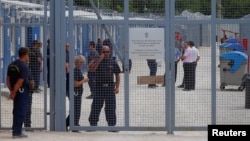Hungary’s tough asylum system has helped cause a bottleneck for up to 7,000 migrants who are now stuck in limbo in Serbia, the Council of Europe Special Representative on migration and refugees said Wednesday.
After visiting two camps built from shipping containers and surrounded by a barbed-wire fence on Hungary’s border with Serbia, Ambassador Tomas Bocek also told Reuters that the migrants were effectively being deprived of their liberty.
The migrants, most of whom hope to reach wealthy western Europe, can only leave the tightly guarded camps by returning south into Serbia, and cannot move freely between the different sections inside the designated area, unless they want to see a doctor.
Deprivation of liberty
In the summer heat, with temperatures around 30 degrees in the scorching sun, the containers heat up and largely have no air-conditioning, he said.
“Let’s say they call it camps but I would say that according to the jurisprudence of the European Court of Human Rights, this is rather deprivation of liberty,” Bocek said in an interview outside the camp at the Tompa crossing point.
“They don’t understand why they are there, why they are in a closed camp, or they call it prison ... and the question that everybody asked me is: when will we get out?”
The container camps currently house about 400 people, mostly fleeing conflicts in Syria, Iraq and Afghanistan.
Tough new laws
Hungary, a member of the European Union, was a major crossing point for hundreds of thousands of people at the height of Europe’s migrant crisis in 2015, heading via Turkey, Greece and the Balkans for western Europe.
Prime Minister Viktor Orban’s right-wing government built a border fence and approved new laws which, along with an EU repatriation agreement clinched with Turkey, helped to sharply cut the number of arrivals, though some still get through.
Orban has called mass immigration from the Middle East and Africa an existential threat to the European way of life.
Under legislation passed earlier this year, all migrants trying to enter Hungary, including children, are held in two camps at the Roszke and Tompa crossings on the border with non-EU Serbia until their asylum requests have been processed.
Very few applications are successful.
Criticized by UN, rights groups
Budapest denies the camps amount to detention centers as migrants are free to return to Serbia, but its policy has been criticized by the United Nations and human rights groups.
Bocek said the Hungarian system for handling asylum was too restrictive as it allows only five people a day to submit requests at each of the two transit zones. As a result thousands of migrants without any status are stuck in Serbia.
“This category is quite huge, and I think we should really reflect reality and address this issue,” he said. “They have some basic human rights and these human rights should be respected.”
The Council of Europe, based in the French city of Strasbourg, aims to uphold human rights and democracy across the continent.





